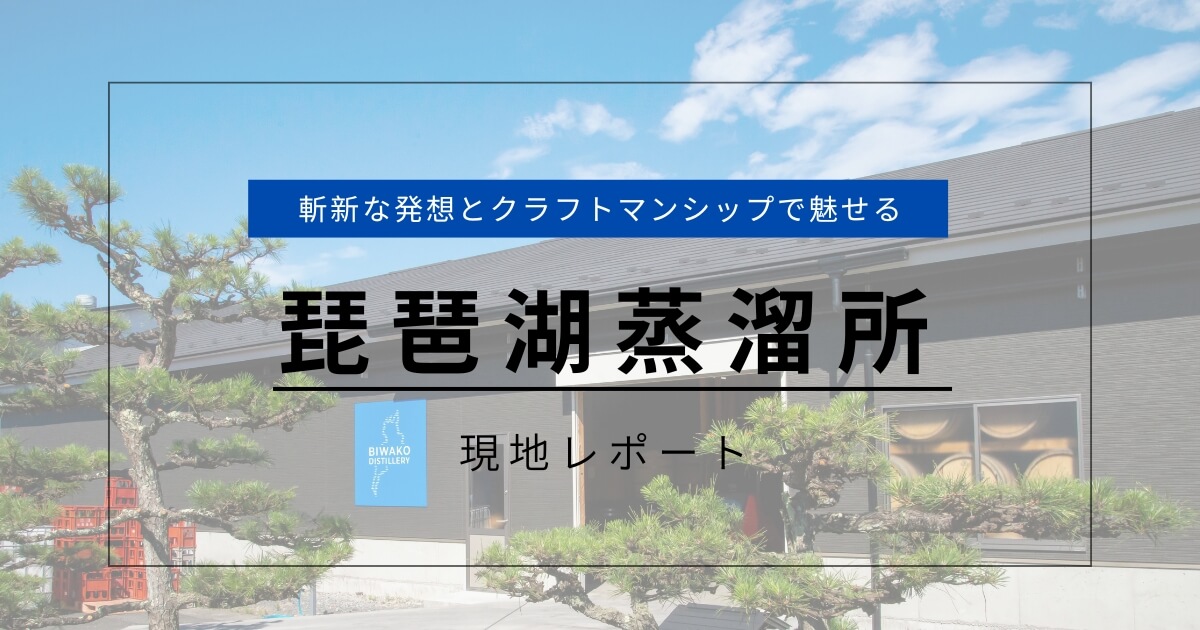
【現地レポート】斬新な発想とクラフトマンシップで魅せる琵琶湖蒸溜所
- 造り手
- 蒸溜所(日本)
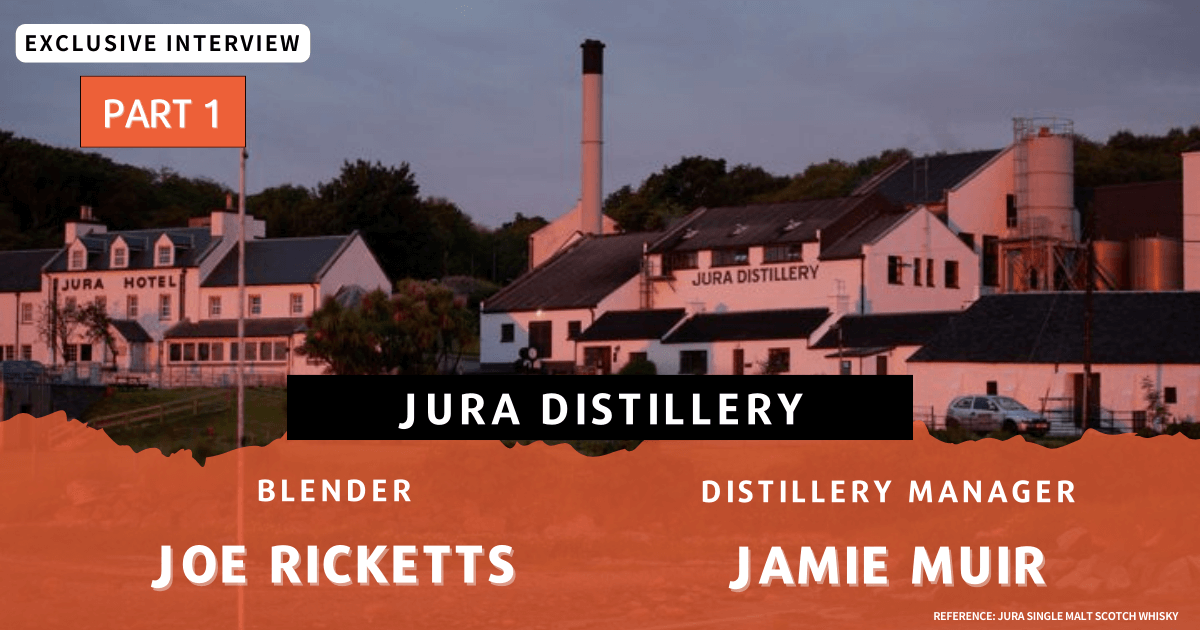
Right next to Islay — the island of heaven for peated whiskies lovers — there is an island called Jura. The island is mostly covered by wild nature with the world’s third largest whirlpool, the Corryvreckan in the North and the national scenic area, Whitefarland Bay, in the South. The tiny community of about 212 people living in the warmhearted town, all share a love for the only distillery on the island — Isle of Jura Distillery.
This time, Dear WHISKY had the honor of sitting with Joe Ricketts, the blender at Whyte & Mackay, an owner of the Isle of Jura Distillery, and Jamie Muir, the new Isle of Jura Distillery Manager. Let us take you through the passionate talk of two whisky professionals, sharing the stories of traditional Isle of Jura Distillery and the new changes in the whisky industry.
In Part 1, we will focus on the personal stories of Joe and Jamie and their lives working for Isle of Jura Distillery. We will talk more about Isle of Jura Distillery’s whisky-making and collections in Part 2, so please check them out as well!
| Distillery | JURA |
| Year of Establishment | 1810 |
| Owner | Whyte & Mackay |
| Official Website | https://www.jurawhisky.com/en/#6 |
| Description | As you can guess from the name, this is the only distillery on the Isle of Jura, and it is managed within the small community of the island. The Jura community is dedicated to the art of whisky making. The whiskies from Isle of Jura Distillery are characterized by a subtle smokiness and a sweet, fruity profile, making them easy to drink. |
Dear WHISKY:
Could you explain your background?
Joe:
I joined Whyte & Mackay three years ago as a blender, so I am part of the blending and whisky-making team.
Prior to that, I started working in the whisky industry at a company called “La Maison du Whisky” in Singapore. I worked on the improvement of whisky life in Singapore by running the retail and events operation in the company.
Afterward, I went to work at two distilleries in London, where I handled a wide range of different spirit categories such as malt whisky, rye whisky, gin, and different botanical spirits.
Then, an opportunity came up to join Whyte & Mackay and to get fully into whisky-making, which was my real passion. And here I am.
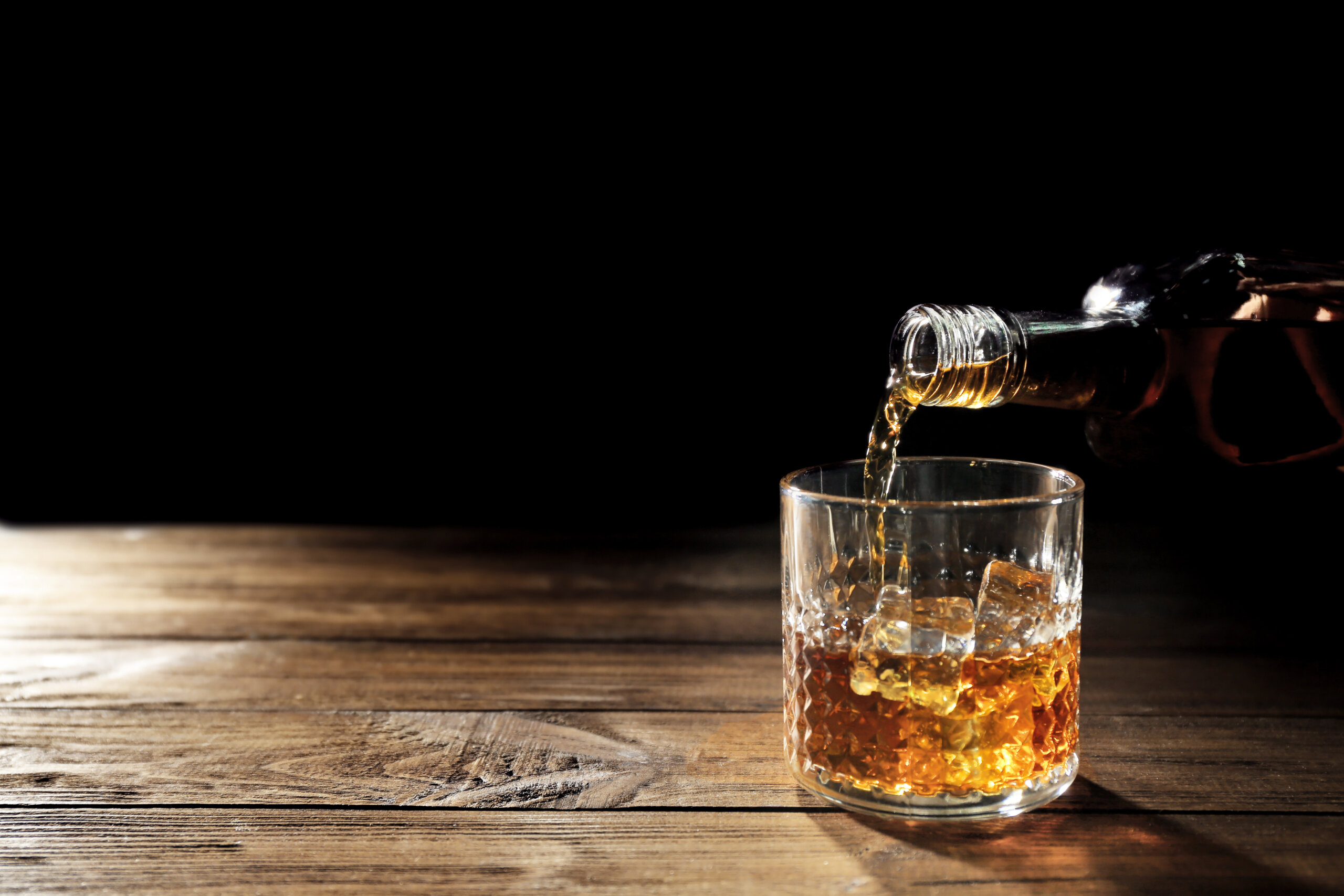
Passion in whisky-making
Dear WHISKY:
What inspired you to begin your career in Singapore?
Joe:
I’m originally from London, and I moved to Singapore for the job. It happened by coincidence.
My partner at the time got a job at an architecture firm in Singapore, and I thought I would go along with her and try to figure it out. That is when an opportunity came up to work for La Maison du Whisky, and so I absolutely jumped at it. After I started in Singapore with them, they basically flew me straight to Paris for training, then back to Singapore to run the operation there.
Dear WHISKY:
What was it like to work in Singapore?
Joe:
It was quite fascinating for me to start in the whisky industry in Singapore, because it was a bit of a hub for that region around Southeast Asia. I would have customers and clients from all over Southeast Asia and beyond. So it was really interesting getting to know
Dear WHISKY:
How do you think your experience in Asia can be valuable?
Joe:
Working in Asia helped me broaden my understanding of the whisky market from just a Europe-centric view of whisky, which I think is hugely important to give it more of a global perspective in terms of the recipes that we create, the tasting notes that we do, the stories that we tell. This process makes it more approachable for people from different backgrounds.
Dear WHISKY:
What was the whisky trend and culture like during your time in Asia?
Joe:
I think I was also very fortunate because I was in Asia around the time when Japanese whisky was really taking off, and La Maison du Whisky was the sole importer and distributor of famous Japanese whiskies such as Nikka, Chichibu, or Karuizawa. I fortunately got to not only sell them but also to try these whiskies with people and understand their interpretations of them with different backgrounds and cultures. So it really helped broaden my understanding of the whisky industry.
Dear WHISKY:
What was your journey like to get to Whyte & Mackay?
Joe:
I had stepped out of working in production at distilleries temporarily first, because I wanted to open up a small distillery with my friend on the coast in England. Going through the process, I realized that perhaps now is not the right time to do it, so we put it on hold.
Even during that time, I always wanted to get back into the industry and fully into production, recipe development and creation. So when I was contacted almost out of the blue that there was an upcoming opportunity in Whyte & Mackay, I went through several steps in the interview process.
Dear WHISKY:
What did the interview process for the blender of Whyte & Mackay entail?
Joe:
I came up to Glasgow to do a sensory evaluation first. Including that, it was a long and quite in-depth process that led me to get the job. But I remember exactly when I got the phone call to say that I had got the position. I was absolutely thrilled, because essentially it was also my dream position, and it’s something that can be a bit of a legacy position if I succeed. This is somewhere I potentially see myself being for the long term.
Dear WHISKY:
Why did you aspire to secure the position of blender at Whyte & Mackay?
Joe:
I had all these wonderful experiences in all the places that I had worked. But I wanted to join Whyte & Mackay because I could potentially play a big role together with someone like Jamie and the distillery team in shaping the future of the distillery, and we can effectively act as custodians for the next generations that will come in and work as blenders and distillery managers. It’s not necessarily something that we own outright. It’s something that we merely work with to the best of our ability and then pass it on to the next generation. I feel extremely privileged to be able to do that.
Dear WHISKY:
Moving onto, could you share us with your background, Jamie?
Jamie:
I am the new Distillery Manager of the Isle of Jura Distillery. I’ve been back working for Whyte & Mackay for the last 10 months now. I started my whisky career on the island of Jura, where I was a mash and still man, because I was born in Jura. After a few years, I moved to Fettercairn Distillery.
Then, I moved to Kilchoman Distillery. They were all totally different types of whisky distilleries. Kilchoman Distillery was a new start-up, small family-run business where they did absolutely everything on-site from barley to bottling. So it was really interesting for my own growth to get involved in the process, which was something I had never experienced in other distilleries.
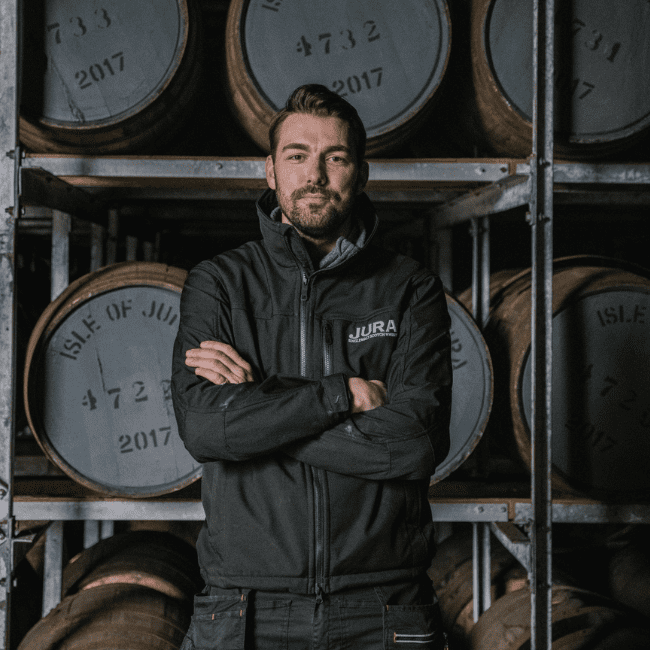
Mr. Jamie Muir, a Distillery Manager (Reference: The Spirits Business)
Dear WHISKY:
Your diverse experience working at different distilleries has given you a broad perspective on whisky production.
Jamie:
Indeed. After Kilchoman Distillery, I worked at BrewDog Distillery for the last five years. BrewDog is a beer company with a spirit side of the business. So, just like how Joe made gin, vodka, rum and whisky, I got to experiment and create my own liquid, pushing myself to get a holistic view of the spirit industry rather than just the whisky industry. Then again, like Joe, my real passion has lied within whisky.
Dear WHISKY:
What was the essence of your career journey?
Jamie:
For me, it was always about the fact that I was interested in loads of different things. I think that is what my career has always wanted to do: challenging myself and pushing myself. It was a dream, but I never knew the blueprint of how to get to the level.
Dear WHISKY:
Why did you decide to come back to Isle of Jura Distillery?
Jamie:
Since that is where I’m from, getting back to Isle of Jura Distillery was my ultimate goal. When the manager position at Isle of Jura Distillery came up, I jumped at the chance, and I luckily got to convince someone that I was good for the job. I am thankfully still here after 10 months into the job.
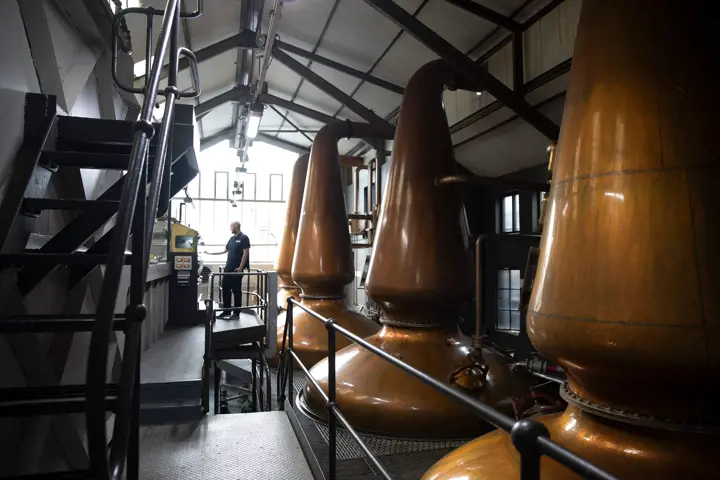
Inside of Isle of Jura Distillery (Reference: Jura Single Malt Scotch Whisky)
Dear WHISKY:
What do you like about growing up on Jura Island and working here?
Jamie:
I grew up here and always love the culture that we have here. It’s a really small, tight community, so each individual gets to have an impact here. And I don’t just mean it within the community, but the distillery itself too. It’s going from strength to strength, and there is going to be a massive amount of change over the next couple years, and I get the excitement and enjoyment from being in the driving seat and pushing all that forward.
Moreover, working with people like Joe, who have that same sort of passion, drive, and look at how Jura can be is such an attractive idea. What makes me want to be in the Isle of Jura Distillery with Whyte & Mackay is the ambition that they have.
Dear WHISKY:
What was it like when you applied for the position of Distillery Manager?
Jamie:
I kept the fact I applied relatively quiet. I didn’t even tell any of my family that I’d applied for the job. It’s funny, when I first started, for me, this manager room was like Mecca. That was the best job I could ever think about having.
Over the years, once you gain experience, when you look at your own CV, you’d realize that you have actually done everything. I never thought I’d be able to do all the things I’ve done. And being an Auxiliary Manager at BrewDog, I just thought, “well, it’s across four different spirits. Surely I can manage one big spirit whisky.” That’s how I decided to apply for this position, and then I got the first interview to the final interview. And that’s when I told my family.
Dear WHISKY:
How do you feel about being the new manager?
Jamie:
It was a proper dream come true, and I still remember the moment I was told that I had got the job. It’s definitely the proudest moment I’ve had in my career so far.
Also, I love being back. I love being on the island and seeing my family more. I love the responsibility of being the distillery manager, the path that is on, and being able to have that influence.
Dear WHISKY:
What was your impression of being a part of Whyte & Mackay?
Jamie:
Working for Isle of Jura Distillery and Whyte & Mackay, you would be a part of a bigger company that has global ambitions, and you would find out your position within that sort of structure. And it was pretty low down in the beginning. However, as long as you start making efforts there, then you could definitely progress. And I think that’s one of the biggest things for me about the whisky industry in general.
Dear WHISKY:
Joe, could you tell us why you decided to be in this industry?
Joe:
I’ve always been interested in flavor in general. Whether it comes to food or drink, it’s formed a lot of my most significant memories over my lifetime, and probably the earliest memories I can recall are related to aroma or taste. So it’s something that I’ve always been fascinated by.
That is why, from a young age, I had always thought about what would be the most interesting way for my senses to help create things for other people to share and enjoy with their loved ones. This led me to whisky, because it is an inherently complex spirit when it’s produced and matured properly.
The memories and experiences it can give to people, no matter what your background, can bring people together and tell stories in a way that a lot of other creations can’t to that extent.
Dear WHISKY:
Why does your passion lie within the whisky industry with your interest in flavor?
Joe:
I’ve also had wonderful experiences drinking other spirits like rum and mezcal. But for me, one of the most memorable moments is sharing a glass of whisky with my friends. This drives me to find an opportunity in the whisky industry to recreate the memory for other people.
Even in the process of whisky-making, creating something individually or as a team sometimes recalls a special memory. Then I would want to get into production based on them.
Dear WHISKY:
Jamie, how do you see Joe’s role in Isle of Jura Distillery’s work?
Jamie:
Joe has been especially extensive with his job. Although the whole team here produces the spirit and puts it in the cask, Joe is the custodian. Once the spirit is in the cask, we all play to make sure that Isle of Jura Distillery has the best product that we can possibly make. And it’s that collaborative effort for me. But Joe is ultimately the guy that makes it into what it is today and I think that partnership is what makes Isle of Jura Distillery so great.
Dear WHISKY:
How about you, Jamie?
What motivated you to enter the whisky industry?
Jamie:
In my case, I am a product of where I live. The whisky industry is a culture over here. In my childhood on Jura Island, there were only 150 people that had been living on the island, and the main industry was the Isle of Jura Distillery. It was the biggest employer at the time, and it’s still one of the biggest industries that we have on the island. I knew people who worked in the distillery. And now it has just become my time to do it.
Besides that, since I went to school on Islay every day by traveling over, where the whisky industry is really big with currently 10 plus distilleries, it was ingrained into everything that happened around me.
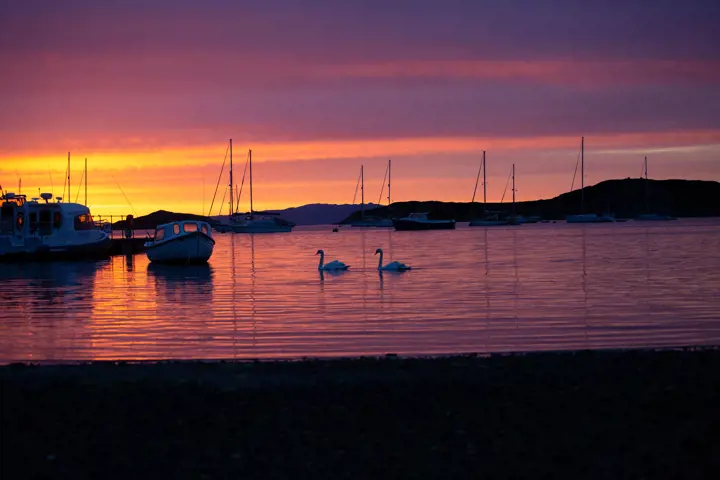
Isle of Jura (Reference: Jura Single Malt Scotch Whisky)
Dear WHISKY:
It is very interesting that the unique environment in Jura naturally led you to be a part of the whisky industry.
Jamie:
Yeah, but I didn’t know what was going on behind this big, beautiful, white building of Isle of Jura Distillery. All I knew was the end result of this bottle of liquid gold that sat on a bar and appeared at every major event that happened on Jura Island. Every celebration that happens on this island, there is always a bottle of Jura whisky somewhere.
Although having a drink of them or witnessing my dad tasting them or sharing them with friends was part of what you are when you grow up, I didn’t know what was happening behind the walls when I used to drive past the distillery. But I knew it was something cool that everybody enjoyed. So, I think that naturally piqued my interest and my imagination.
Dear WHISKY:
Not only as a workplace, Isle of Jura Distillery has been a hub of culture as it has always been a part of people’s lives!
Jamie:
Also, Isle of Jura Distillery and all the other distilleries on Islay have done such a great job of telling all these stories over the years and creating a mystique around them. It captivates you. So, it was a natural progression for me to get into the whisky industry to see them. And getting the job here is a real proud moment for me.
When I got into the world myself and realized how amazing and far-reaching it can be, as I can see the growth that we have out in Asia now from this tiny little island, it was unbelievable. Furthermore, being able to see the work that goes into that, the effort that everyone makes naturally just captivates you and makes you want to then stay within that industry. I can’t see myself being anywhere else now.
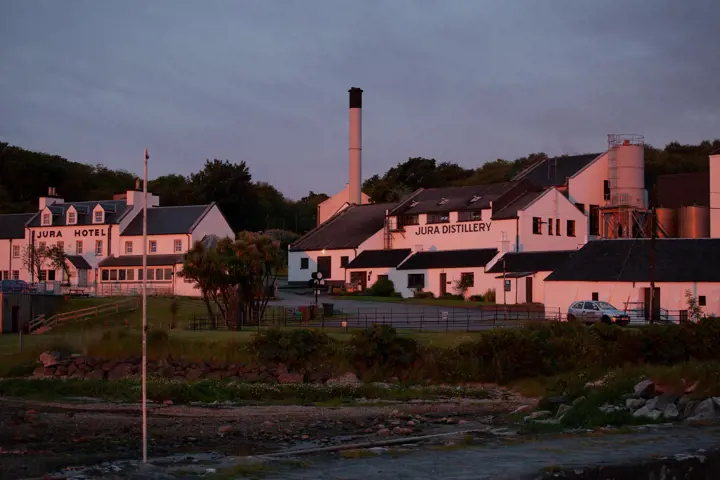
Isle of Jura Distillery (Reference: Jura Single Malt Scotch Whisky)
Dear WHISKY:
Did the mystique around the distilleries that Jamie mentioned also attract you, Joe?
Joe:
Yeah, so adding onto Jamie, the mystique and romance for people around the whiskies that we create is important and true to our work, because there are some processes that we still don’t fully understand as an industry. In this sense, we actively have to work alongside rather than just pressing buttons. This isn’t a factory-made product that is on a conveyor belt where everything gets made in exactly the same, controlled way. We are at the mercy of nature, and we merely work with natural raw materials and natural processes to try and create these wonderful things for people.
For me, that is also one of the most interesting parts of the industry, because the creation and the process are not the same every time.
Dear WHISKY:
When do you notice that aspect the most during the whisky-making process?
Joe:
There are times when we have been evaluating casks, and the identical casks with identical spirits could be sitting right next to each other in the warehouse for 40 years. However, they could have completely different end results with different flavor profiles by going down different maturation paths. And I love that this is a significant factor in whisky-making with the unpredictable aspect all the time. This is in the same way as an orchestra in which you have more instruments and sections to play with to create music.
So, no two casks are the same. They might be fairly similar, but you would still get slight variances. This forms a significant part of that romance and mystique that we see internally as recipe creators, as well as people drinking it.
Dear WHISKY:
It seems like you view whisky-making as a form of art. Do you draw inspiration from other artworks?
Joe:
Absolutely. One of the first things I read about whisky when I was learning about it early on was a quote that it was once linked to art and a science. So it’s a combination of the two. It’s not more so one or the other.
When it comes to art in general or the creative process, I’m constantly looking for inspiration, whether it’s writers, artists, musicians, or anything. Even just walking down the street and smelling a flower in someone’s front garden could be my creative inspiration. They can lead to a concept or an idea, and I include them in a tasting note that I write.
Dear WHISKY:
It’s fascinating to imagine that JURA bottle we see may have been inspired by those small, everyday things.
Joe:
I try to keep the pool of inspiration as broad and deep as possible and not take anything for granted in that respect, because, when ideas or creative processes kick into gear from seemingly the most irrelevant experiences on paper, they can turn into something fantastic. So yes, I always have my eyes, ears, nose, everything open and alert to the surroundings, because you never know when inspiration will strike.
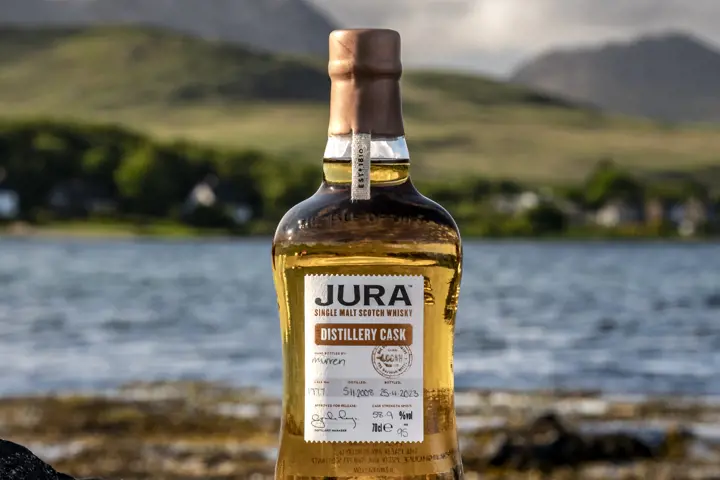
JURA SINGLE MALT SCOTCH WHISKY (Reference: Jura Single Malt Scotch Whisky)
Dear WHISKY:
Joe, how do you usually spend a day as a blender in the Whyte & Mackay?
Joe:
Most days are different. Being a part of the blending team, which is relatively small, we work across all of the distilleries in the Whyte & Mackay portfolio and other areas as well. So we have a number of projects across all the distilleries, the brands, and the different departments that we work with. We handle quality control on a daily basis too.
Dear WHISKY:
What are your responsibilities regarding your role?
Joe:
We would be based at the head office in Glasgow and go to the sample room there, so that’s where I’m based. In terms of regular sensory evaluation and quality control, we evaluate 40 to 50 samples a week. In addition to that, we also have our own personal recipe development processes. We also develop pilot recipes while maintaining the quality and consistency of everything that Whyte & Mackay produces. So our days could be dedicated to that.
There is a lot of other stuff too. It could also be traveling around the world to do spirit evaluation and in-market activity. It could be writing tasting notes. It could be storytelling pieces.
Dear WHISKY:
Jamie, how do you spend a day working as a manager of Isle of Jura Distillery?
Jamie:
Like Joe, there’s no typical day at Jura. That is the big takeaway from that question. Everything is ever-changing between day-to-day operations and checking in with the staff, there is usually a breakdown somewhere along the line throughout the day that we have to attend to. However, it’s the charm that makes the whisky as well. Every day is challenging, but there are not many days I don’t put a smile on my face. And aside from that, we look at a lot of projects that we have going on.
Dear WHISKY:
Are there any difficulties living on a tiny and segregated island?
Jamie:
The nature of the segregated islands can be really challenging, and getting things onto the islands and keeping people there are difficult. When I was younger, I had brothers and many friends who would leave schools and look for jobs in Isle of Jura Distillery. Now that’s not the case, since we are going through this phase where there are not so many people that are looking for jobs here on the island. Even getting people from outside is hard, because housing would be an issue. We get ferry issues and weather issues as well. There is the risk of breakdown with our old-style plant, so we have to be prepared for maintenance planning with backups and electricity. It’s not just one thing that contributes to it being difficult, but it’s an accumulation of things.
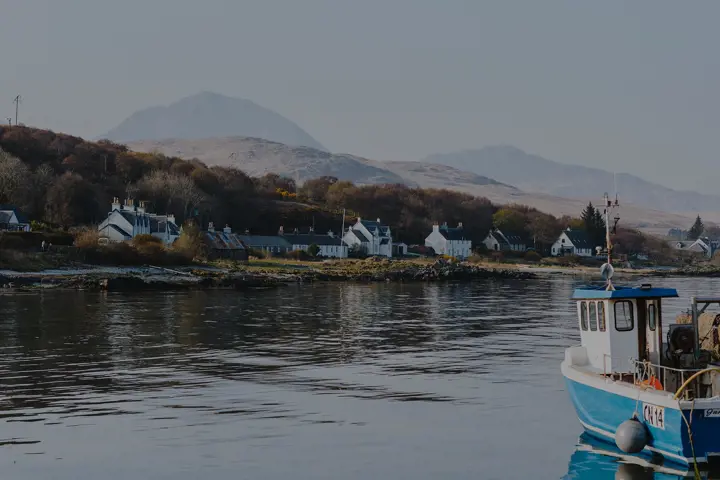
The nature of Isle of Jura (Reference: Jura Single Malt Scotch Whisky)
Dear WHISKY:
How do you overcome these challenges?
Jamie:
I just have to do the best I can. This was just a part of growing up on Jura Island. For example, in my childhood, I sometimes didn’t get to school because the ferry didn’t run. Even now, there would be a day where the ferry wouldn’t go or a day where somebody calls in sick, but it’s just part of the problem where you have to navigate around it, and everyone pulls together as a team effort. You would just accept it and live with it. Your whole outlook on life is far more relaxed here, and it becomes easier to swallow these things when they do happen. It’s outside your control.
Dear WHISKY:
Are you trying to attract more people to the Jura Island by utilizing the popularity of Isle of Jura Distillery?
Jamie:
That’s the ultimate goal for me. If housing, ferries and everything was sorted, and we had a job advertised, we’d have hundreds of people wanting to come here, because this is a brilliant distillery with a brilliant company, and it’s only going from strength to strength. So ideally, I want people to come here and feel “look at how beautiful and romantic the place is”, and really fall in love with not just the whisky, but the island itself. I think part of the charm of Isle of Jura Distillery is the fact that the whisky reflects the beautiful culture that we have here.
Dear WHISKY:
Joe, how do you think the life on Jura island is different from how you have been living in big cities like Glasgow?
Joe:
Being based in a city, I have always tried not to get caught up in the intensity of city life. Being on Jura island, it makes me feel that there are some things out of our control, because we are at the mercy of nature when it comes to logistics and infrastructure. Even when it comes down to whisky-making, we just have to embrace it and adapt. I think it’s about respecting nature and understanding it. Sometimes we don’t get what we want, but we just have to work and coexist alongside it basically. When the sun does shine, and things do go well, we appreciate everything even more. I guess that’s the way of the Jura island and also the philosophy of Isle of Jura Distillery.
This is the end of our first interview report!
In Part 1, Joe and Jamie shared the stories behind their journey in the whisky industry, as well as what it is like to be working for Isle of Jura Distillery.
In Part 2, you can expect to learn more about Isle of Jura Distillery’s whisky-making, as well as their philosophy and whisky collection, so stay tuned!